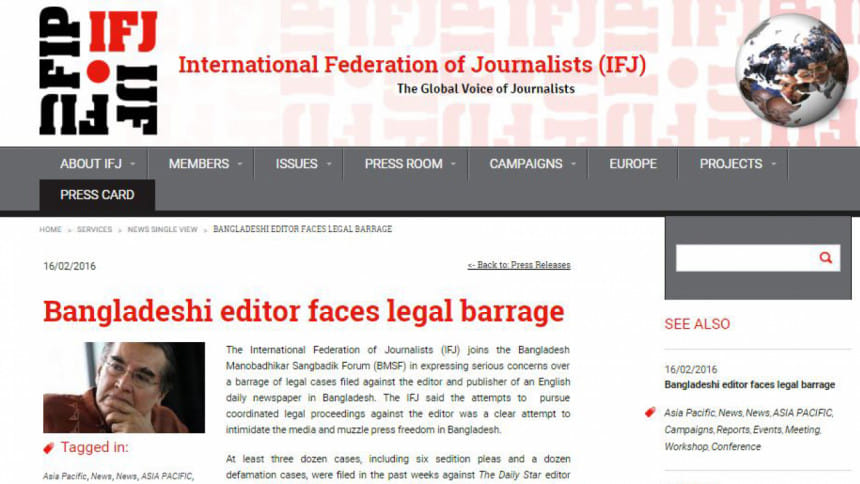IFJ worried at cases against Star editor

The International Federation of Journalists (IFJ) has expressed serious concerns over a barrage of cases filed against Mahfuz Anam, editor and publisher of The Daily Star.
“The IFJ is seriously concerned by the legal harassment of Mahfuz Anam as [a] result of reporting in the public interest at a time of political crisis,” it said in a statement on its website yesterday.
”The high number of cases and the filing of these across the country indicate an aggressive politically-motivated effort to harass a senior editor and a key newspaper in Bangladesh."
The IFJ said the “attempts to pursue coordinated” legal proceedings against the editor was a clear attempt to intimidate the media and muzzle press freedom in Bangladesh.
At least three dozen cases, including six sedition pleas and a dozen defamation cases, were filed in the past weeks against Anam in 17 districts of Bangladesh by various individuals and political groups, the statement said.
The Federation also expressed its solidarity with Bangladesh Manobadhikar Sangbadik Forum (BMSF) in offering its concern over the matter.
“The use of sedition and defamation laws in this case is extremely concerning," it said.
The legal actions were launched after the editor admitted during a televised interview on February 3 to a lapse in his editorial judgement in publishing reports based on information supplied by the country's task force intelligence cell during the caretaker government regime almost a decade ago without being able to independently verify them.
The organisation said the military-backed interim government had declared a state of emergency in 2007, detaining the leaders of the two biggest political parties and initiating cases against them.
"Sedition laws are regarded as a relic of the past but are too often being revived as a means to silence political opposition and criticism in the region. This is a worrying development in an already extremely challenged media environment of Bangladesh,” it said.
The statement also referred to lawmakers' demand on February 7 for Anam's punishment and suspension of the newspaper for “lacking professional integrity”.
The newspaper suffered massive losses in revenue after the Bangladeshi authorities forced a leading telecommunication company to stop advertising, it said.
“It is critical that legal system is not used by some groups to harass the journalist and media and we urge the judiciary to intervene in the matter to ensure a full and fair trial, with all cases being heard in one court.”
The IFJ is the largest organisation of journalists representing around 600,000 members in 139 countries. First established in 1926, it was relaunched in 1946 and again, in its present form, in 1952. The federation promotes international action to defend press freedom and social justice

 For all latest news, follow The Daily Star's Google News channel.
For all latest news, follow The Daily Star's Google News channel. 



Comments